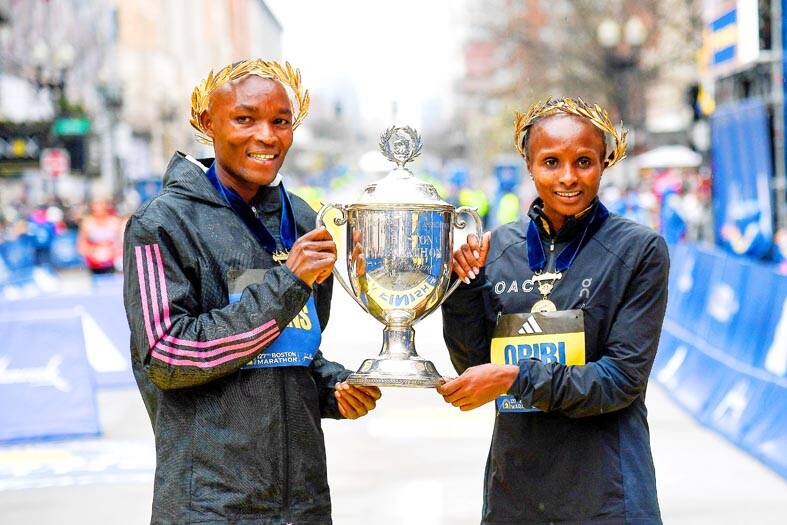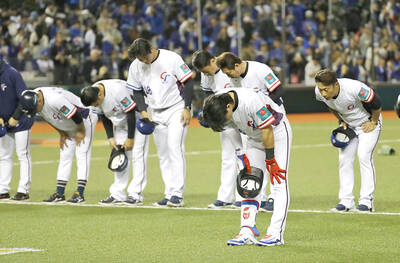Evans Chebet and Hellen Obiri on Monday stormed to victory in the men’s and women’s races at the Boston Marathon to complete a third straight Kenyan double in the 127th edition of the long-distance showpiece.
In rainy, cool conditions, defending men’s champion Chebet upstaged world record holder Eliud Kipchoge to become the first man to defend the Boston title since Robert Kipkoech Cheruiyot’s 2006-2008 hat-trick.
Chebet finished in a time of 2 hours, 5 muinutes, 54 seconds, with Tanzania’s Gabriel Geay second in 2:06.04, and Chebet’s training partner and fellow Kenyan Benson Kipruto third in 2:06.04.

Photo: Eric Canha-USA Today
There was disappointment for two-time Olympic champion Kipchoge, widely regarded as the greatest marathon runner of all time. He had been bidding to add the Boston crown to previous marathon victories in Berlin, Tokyo, London and Chicago.
Kenyan icon Kipchoge trailed home sixth in 2:09.23, about three-and-half minutes adrift of Chebet.
The 38-year-old had looked perfectly poised through the opening and mid-stages of the race, but was broken after a bold attack by Geay at about the 30.5km mark.
As the pack gave chase to Geay, Kipchoge was rapidly left behind and was soon nearly 100m off the pace.
Geay remained in the lead through 38.6km in a leading trio alongside Chebet and Kipruto, but Chebet and Kipruto kicked on in the final 3km and Chebet led with 1.6km to go before pulling away to retain his crown.
“I’m happy because I know this course very well,” Chebet told ESPN following his win. “I won last year, and now I’ve won this year — so maybe next year I’ll come back again.”
While Chebet was able to draw on his experience from last year to master Monday’s course, Obiri pulled off a stunning victory in the women’s event in what was only her second-ever marathon.
The 33-year-old has spent most of her career racing over shorter distances, winning two world championship gold medals in 2017 and 2019 over 5,000m, as well as silvers over the same distance at the 2016 and 2020 Olympics.
Obiri, who only raced a marathon for the first time in New York in November last year, where she placed sixth, kept her composure in a hard-fought race to win in 2:21.38.
Ethiopia’s Amane Beriso was second in 2:21.50, while Israel’s Lonah Salpeter took third in 2:21.57.
It was a remarkable performance by Obiri, who only confirmed her participation in Boston last month following urging by her coach.
“First of all I didn’t want to come, because my heart was somewhere else, but the coach told me: ‘My heart says you should go for Boston,’” Obiri said. “I said no, because it’s a strong field, but he said: ‘You’ve trained well, something tells me go to Boston.’”
I’m very happy because it’s a surprise to me, but I was feeling like my body was ready, and everything was ready,” she said.
Obiri bided her time before hitting the front with about 0.8km to go, pumping her arms and driving her legs through the rain to drop the chasing pack.
“The coach told me that marathons are about patience, patience, patience until the last minute,” Obiri said. “So I just tried to be patient.”

Taiwan kept their hopes of advancing to next year’s World Baseball Classic (WBC) alive with a 9-1 victory over South Africa in a qualifier at the Taipei Dome on Saturday, backed by solid pitching. Taiwan last night played against Nicaragua. As of press time, Nicaragua was leading 6-0. Bouncing back from Friday’s struggles on the mound, when Taiwanese pitchers surrendered 15 runs to Spain, Team Taiwan on Saturday kept the visiting team in check, allowing just one run in the bottom of the fourth inning. Starting pitcher Sha Tzu-chen struck out one and allowed no hits, except for a hit-by-pitch over

Taiwan kept its hopes of advancing to the 2026 World Baseball Classic (WBC) alive with a 9-1 victory over South Africa in a qualifier at the Taipei Dome last night, backed by solid pitching. Bouncing back from Friday’s struggles on the mound, when Taiwanese pitchers surrendered 15 runs to Spain, Team Taiwan kept the visiting team in check, allowing just one run in the bottom of the fourth inning. The win was crucial for Taiwan, as a loss would have eliminated the team from contention for the next WBC. Starting pitcher Sha Tzu-chen (沙子宸) struck out one and allowed no hits, except for

Team Taiwan are set to face Spain in a win-or-go-home match tonight for the final berth at the 2026 World Baseball Classic (WBC), despite losing to Nicaragua 6-0 in the WBC qualifier at the Taipei Dome on Sunday. The home team’s loss on Sunday means Nicaragua finish first in the qualifier round in Taipei with a perfect 3-0 record and advances to next year’s finals. After crushing South Africa 9-1 earlier on Sunday, Spain took second place in the four-team qualifier with a 2-1 record. With a 1-2 record, Taiwan finished third while South Africa placed at the bottom with

Team Taiwan avoided missing the World Baseball Classic (WBC) for the first time by defeating Spain 6-3 in a do-or-die game in Taipei last night. After narrowly escaping a mercy-rule loss to Spain in the WBC Qualifiers opener on Friday last week, the home team — winner of last year's WBSC Premier12 title three months ago — got their revenge against the 2023 European champions at Taipei Dome. "It felt quite different from when we won the Premier12," Taiwan captain Chen Chieh-hsien (陳傑憲) said after the game, recalling the ups and downs the team has experienced over the past few days. Unlike in